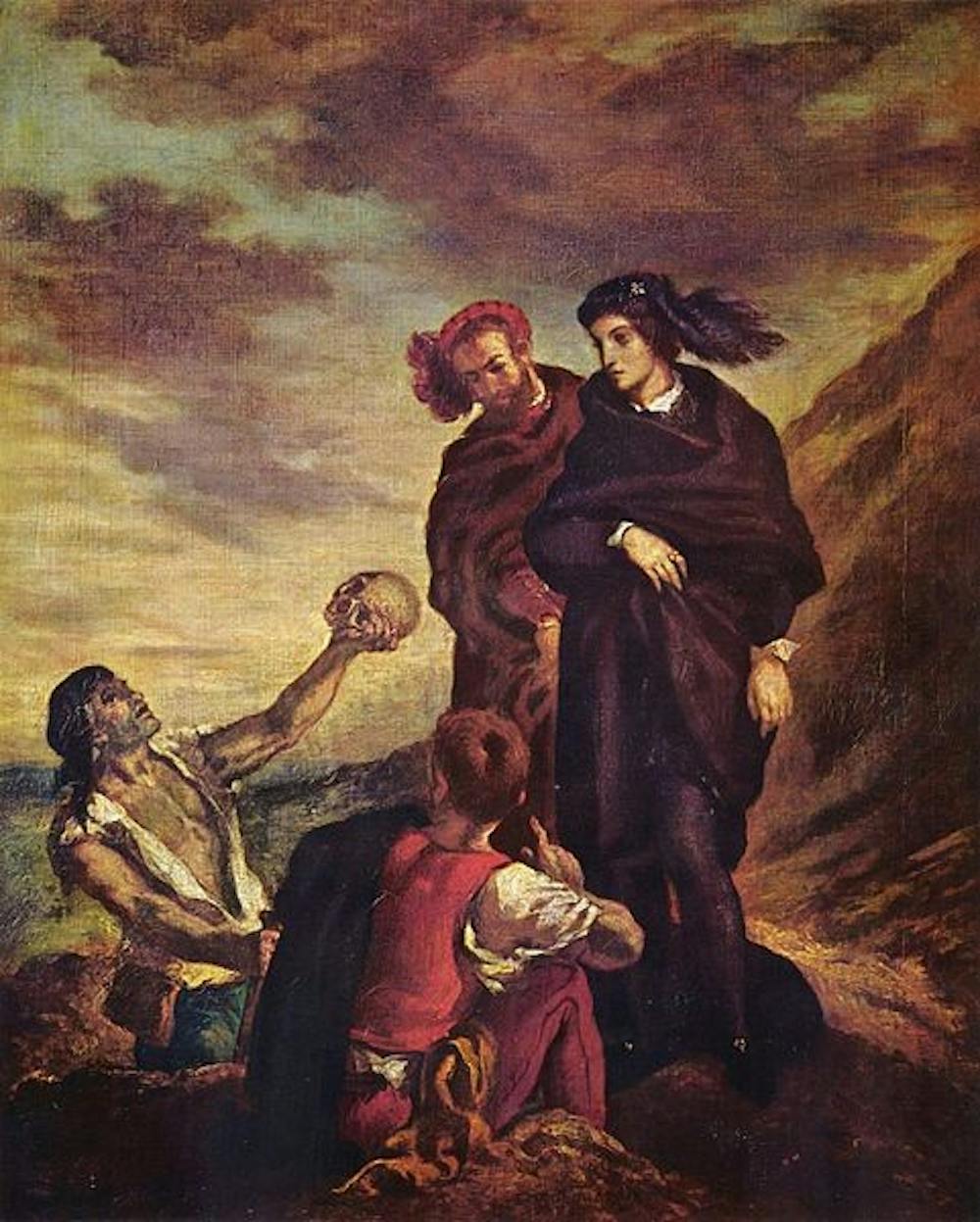 The "gravedigger scene" from Hamlet by Eugène Delacroix (1839 ) (Photo Courtesy of DIRECTMEDIA Publishing)
The "gravedigger scene" from Hamlet by Eugène Delacroix (1839 ) (Photo Courtesy of DIRECTMEDIA Publishing)This week, as I paced the stacks of a local bookstore, I came upon an obscure gem, a diamond in the rough, if you will. I found a drama written by a little-known English playwright by the name of William Shakespeare (Sha-key-spearey? Shakes-peery? Shahks-pear-ay?) titled "The Tragedy of Hamlet, Prince of Denmark." The play, based around the life of a young Prince of Denmark, seemed to promise all that I could ask out of a good ol' heroic tale: love, adventure and a little mystery here and there.
What I found can only be described as the retelling of the young Prince Hamlet going through your standard teenage "scene phase," except with a little less Fall Out Boy and a little more "Oedipus Rex." All the classic characters are there: the distant mother, the misunderstanding stepfather, the girlfriend he can't trust and, of course, the ghost of Hamlet's beloved father. OK, maybe this isn't just your run-of-the-mill teenage drama, but what kind of father orders Hamlet to kill his murderous uncle in order to avenge the original fratricide? No wonder our little Hammy is so messed up. Between that, his hyper-sexualized mother and his nutty girlfriend, I'm surprised Hamlet holds up for as long as he does.
@JohnLithgow as Lear tonight: amazing. Shakespeare: not good. No stakes, not relatable. I think I'm realizing: Shakespeare sucks.
— Ira Glass (@iraglass) July 28, 2014
On top of all of this, the little prince is about as sexually repressed as they come (even more so than my dear friend Hemingway) and can't seem to get a grip on his urges as he throws himself over and over again at his dear, long-suffering Ophelia in the most inappropriate of places. From the halls of his palace to the seats of a play with both of their families present, Hamlet just can't seem to figure out where to woo his lady friend. We can't help but blame the guy for his awkward timing. Everything else in his life has become a struggle, so why wouldn't this be equally difficult?
Hamlet is the angstiest kid I've ever read, and he makes no attempt at hiding it. I guess I can respect that. Even his classic philosophical line is wracked with the weight of his teen troubles. His indecision about everything, including his own life, is clear here. "To be or not to be:" Have you ever heard anything angstier than that? He can't decide if he loves Ophelia. He can't decide if he hates his mother or if he has some kind of bizarre attraction to her. Most of all, he can't decide if he wants to obey his phantasmic father and commit avunculicide, or if he wants to play it safe and be a helpless kooky prince for a while. Basically, this kid just needs to make up his damn mind.
The story culminates in one of the nastiest bloodbaths I've ever read. Hamlet, his mother, his stepfather, his girlfriend's brother — actually, pretty much everyone but his worst enemy (Fortinbras, Prince of Norway) dies gruesomely. I mean, what is this? I came here for touchingly sincere English prose about life, love and loss, not the ending of a Stephen King novel.
In essence, this mess is a turn-of-the-17th-century soap opera at its core and the drama is rife with every word. While I may not have read the touching tale of love, bravery and redemption that I expected, I can't say that I was disappointed by what I found. I mean, what day is complete without some multiple regicide? I just want to leave our beloved protagonist with a few last words of encouragement from this world to the next: It's just one long bad day, Hamlet. It'll be OK, I promise.
Tell the reporter about your 12th grade English experiences at ezentner@asu.edu or follow her on Twitter @emilymzentner
Like The State Press on Facebook and follow @statepress on Twitter.




